Florida supporters on why they want Trump to win in 2020
- Published
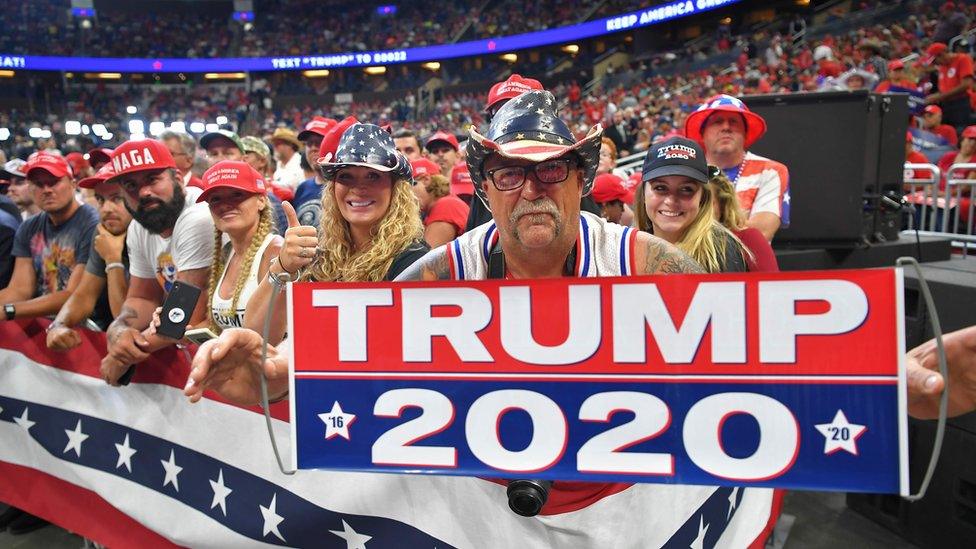
Thousands of fans were packed into Orlando's Amway Center
On Tuesday night in Orlando, Florida, Donald Trump "officially" kicked off his presidential re-election bid.
Of course, everyone knew he was going to run for re-election. That was hardly a surprise. He filed his 2020 paperwork the day after his January 2017 inauguration, and he's been holding regular campaign-style rallies across key battleground states ever since.
And so on Tuesday in Florida - one of the biggest of electoral battlegrounds, a state the president absolutely must win in 2020 - it wasn't about whether Mr Trump was going to seek re-election. It was about how he's going to do it. The event was an unveiling of sorts - a trial run of his pitch to the American people for four more years, before a raucous, red-hat-wearing crowd packing a 20,000-seat arena.
Trump rallies are always a give-and-take affair, with the president trying out lines to see how his supporters react. And the crowd's response to Mr Trump's 78-minute speech offered some clues of what could be in store.
There were the expected boasts about the state of the American economy, which he called "perhaps the greatest economy in the history of our country". He talked about regulation-cutting, boosts in military spending, trade negotiations, tax reform, border security and judicial appointments. All received a warm reception from the audience.
Trump: 'A nation must care for its own citizens first'
"What he's done for this country, the manufacturing jobs coming back, our steel industry coming back, wages for the average American going up, Americans are getting back in homes again - it's a beautiful thing," said Robert Adamson, an insurance salesman from Merritt Island, Florida. "This is the only platform he really gets where he gets a fair shake at being able to divulge his achievements."
The Trump phenomenon has always been about more than policies, however - more than just "promises made and promises kept," as Vice-President Mike Pence said in his exceedingly conventional introductory speech.
Mr Trump's success has been about attitude and the ability to connect with his supporters, to make them feel like they're a part of his movement. And that was once again on display in Orlando.
"I think he resonates with people because he comes across as a regular person," said Paul Barka, a maintenance worker for a college in Tampa, Florida. "He doesn't talk like a polished politician. It doesn't matter if he comes across as being rash or harsh or even ignorant at times."
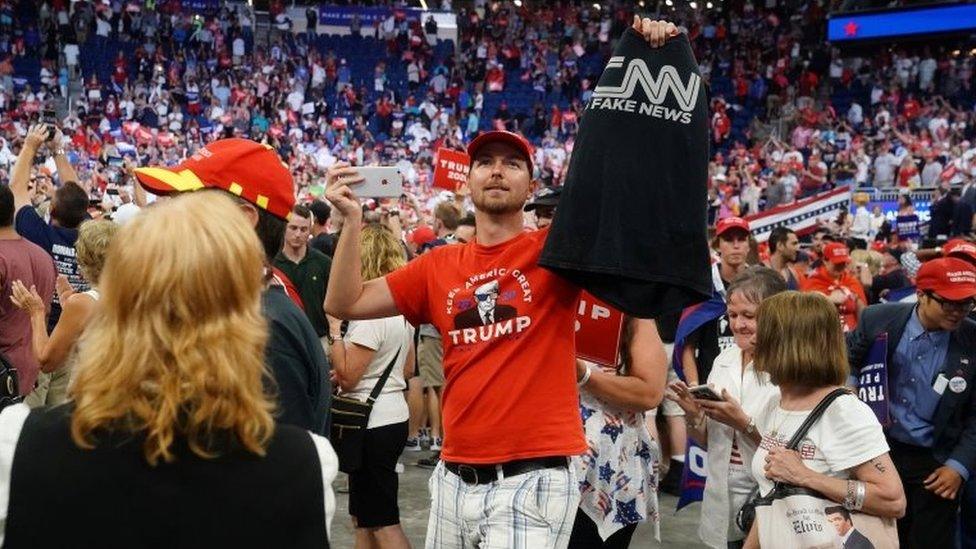
The president's criticism of "fake news" media is now a mainstay of his rallies
At one point, the president polled the audience on whether he should keep "Make America Great Again" as his 2020 campaign slogan or opt for "Keep America Great." The deafening response to the latter option seemed to surprise even him.
Similar levels of audience approbation came when he thanked outgoing press secretary Sarah Huckabee Sanders, who briefly took the microphone to say how honoured she was to have a front row seat to history.
She has been one of the president's most ardent defenders, and the crowd showed their love.
"She's been a fighter," says Christopher Dunn, a graduate student who travelled to the rally from northern Florida with some friends. "It's not conflict we want, we want somebody who won't roll over."
Then there was the airing of grievances. If Tuesday's rally was any indication, the overriding theme of the president's re-election campaign will be a bid for vindication - vindication against his critics in the "fake news" media, in the Democratic Party and among the nation's elite. It's all part of "the swamp," which he said has been fighting back against him "so viciously and violently".
What does this hat mean to Americans?
The president framed that personal vindication as a victory for his supporters - some of whom, he reminded them, were labelled "deplorables" by Hillary Clinton in 2016.
The president also made dark warnings of what could happen if Democrats defeat him in 2020.
"They are really going after you," he said. "They are trying to erase your legacy of the greatest campaign and the greatest election probably in the history of the country."
In case that wasn't direct enough, he added: "They want to destroy you, and they want to destroy our country as we know it."
Outside the arena hours before the event, in the steaming Florida sun, a handful of anti-Trump protesters - the villains in the president's evening drama - waved small "baby Trump" balloons and hoisted handmade signs.
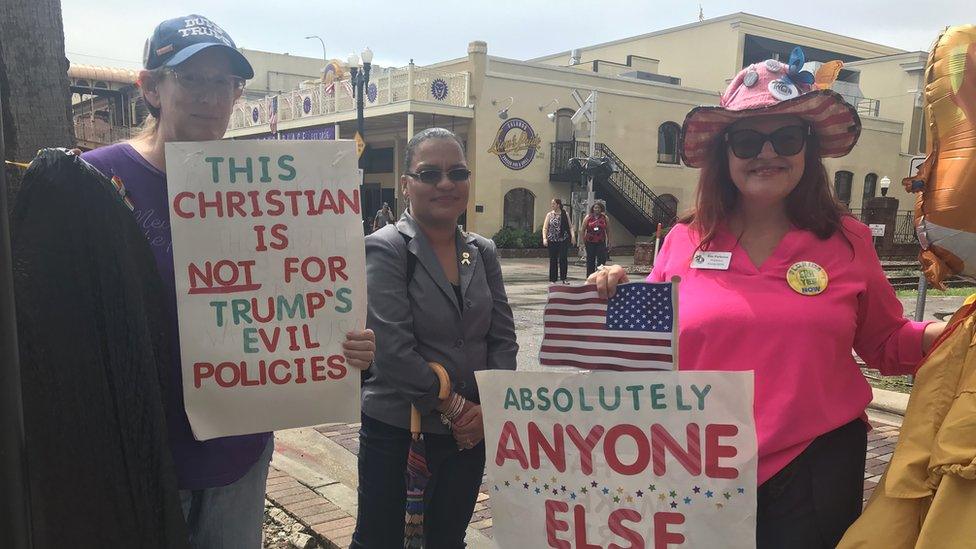
Amy Mercado (center) and Kim Porteous (right) were among protesters
"Absolutely anyone else running - 2020" read one, held by Kim Porteous, the president of Florida's National Organization for Women.
Amy Mercado, a Democratic state legislator from Orlando, stood nearby, and said she expected the president to throw "red meat" to his base.
"They know what they want to hear," she said, "and so that's what he's going to share with them."
She added, however, that the president doesn't just motivate his own base - he motivates the opposition. And unlike 2016, Democrats now know what a Trump presidency is like, and they'll organise to stop it.
That could be what the 2020 election comes down to - a battle of turnout and passion, fuelled by equal parts dedication to the cause and antipathy toward the opposition.
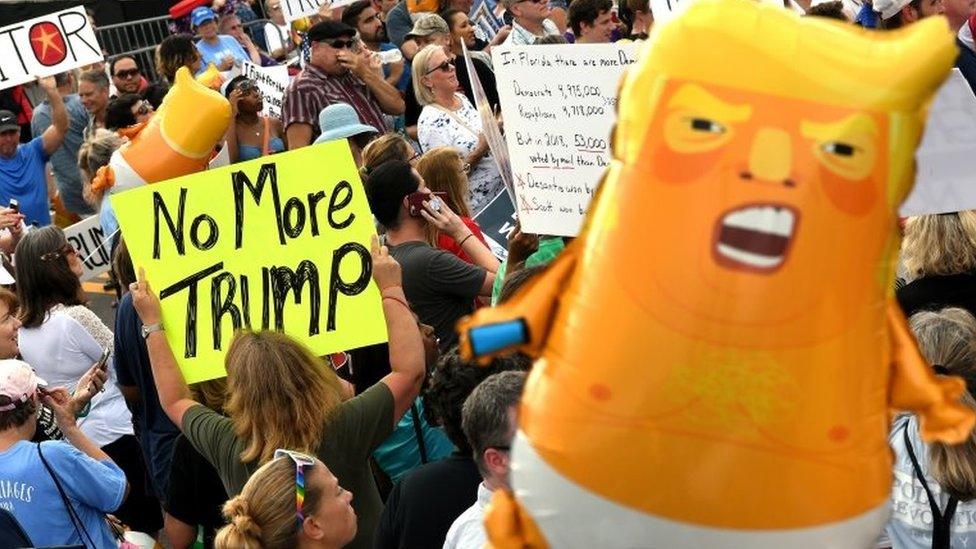
More demonstrators gathered as the president's rally took place
On Tuesday in Orlando, Mr Trump showed he can still draw a massive crowd that is itching for the political battles to come. At least on this night, the enthusiasm among the president's base for his rhetoric and pugilistic attitude hasn't waned, despite polls showing an uphill road ahead for the president. In fact, the enthusiasm may be greater because of those pessimistic polls, because of the us-against-them nature of the undertaking.
It's Mr Trump and his faithful against the Democrats, the media, the world - and, if his speech is a guide, that's just the way the president wants it.
- Published19 June 2019
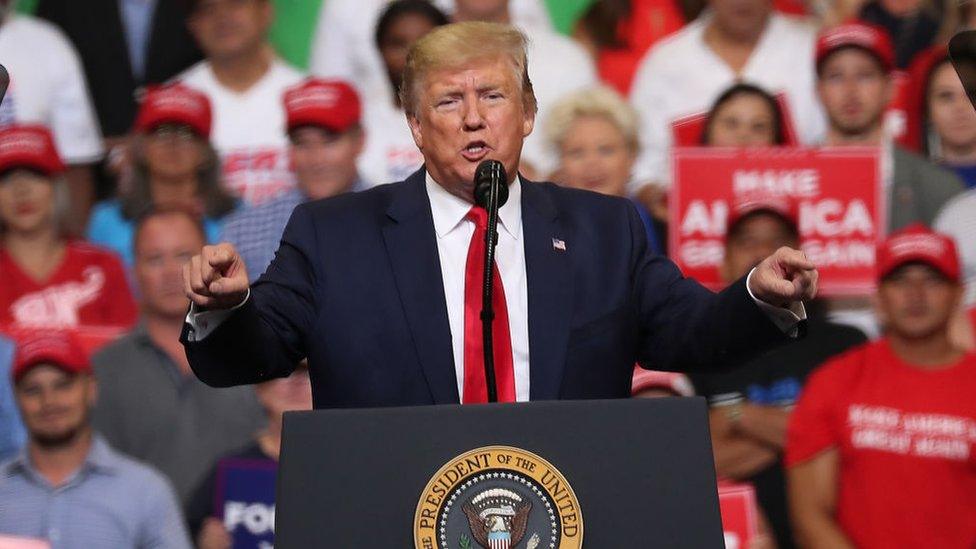
- Published18 March 2019
- Published14 February 2019
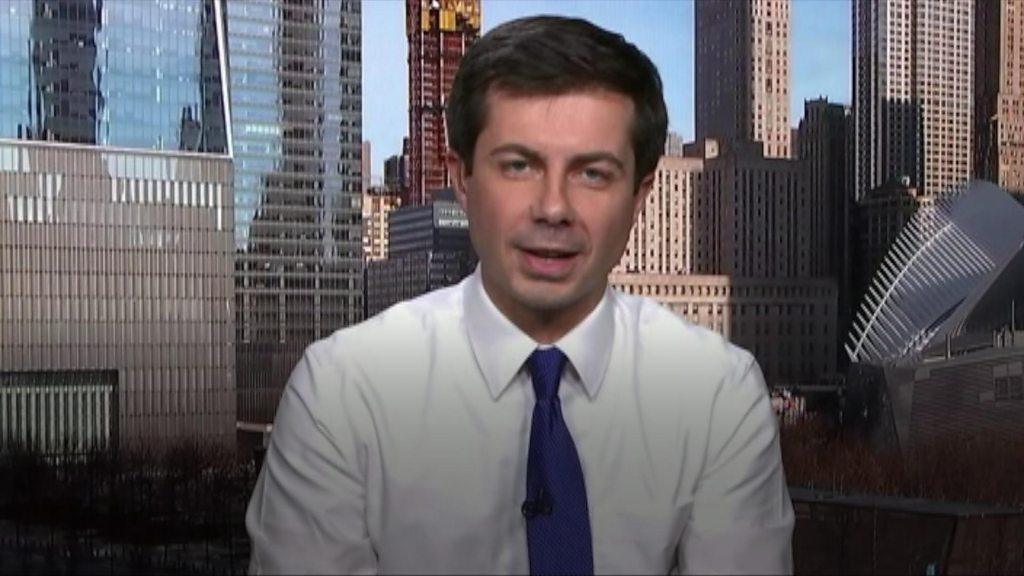
- Published22 March 2019
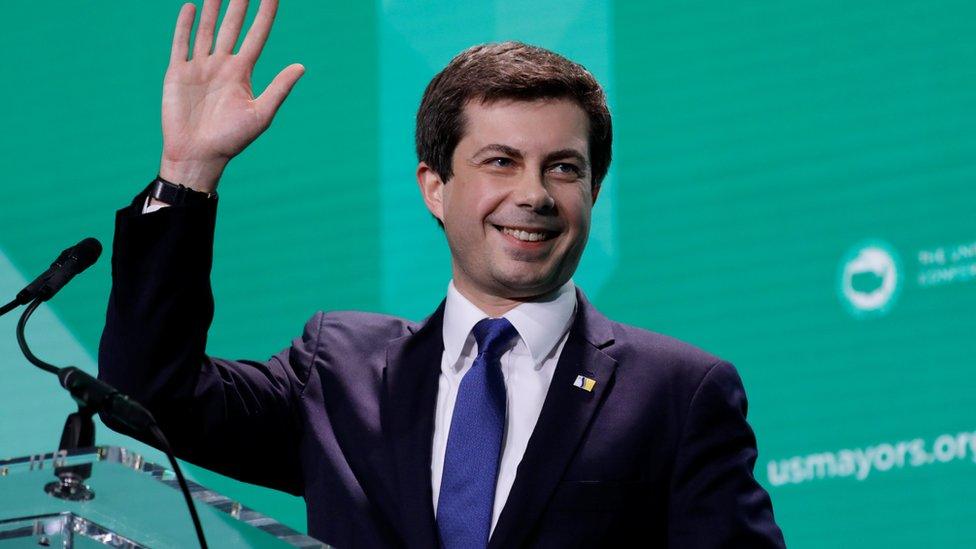
- Published23 January 2019
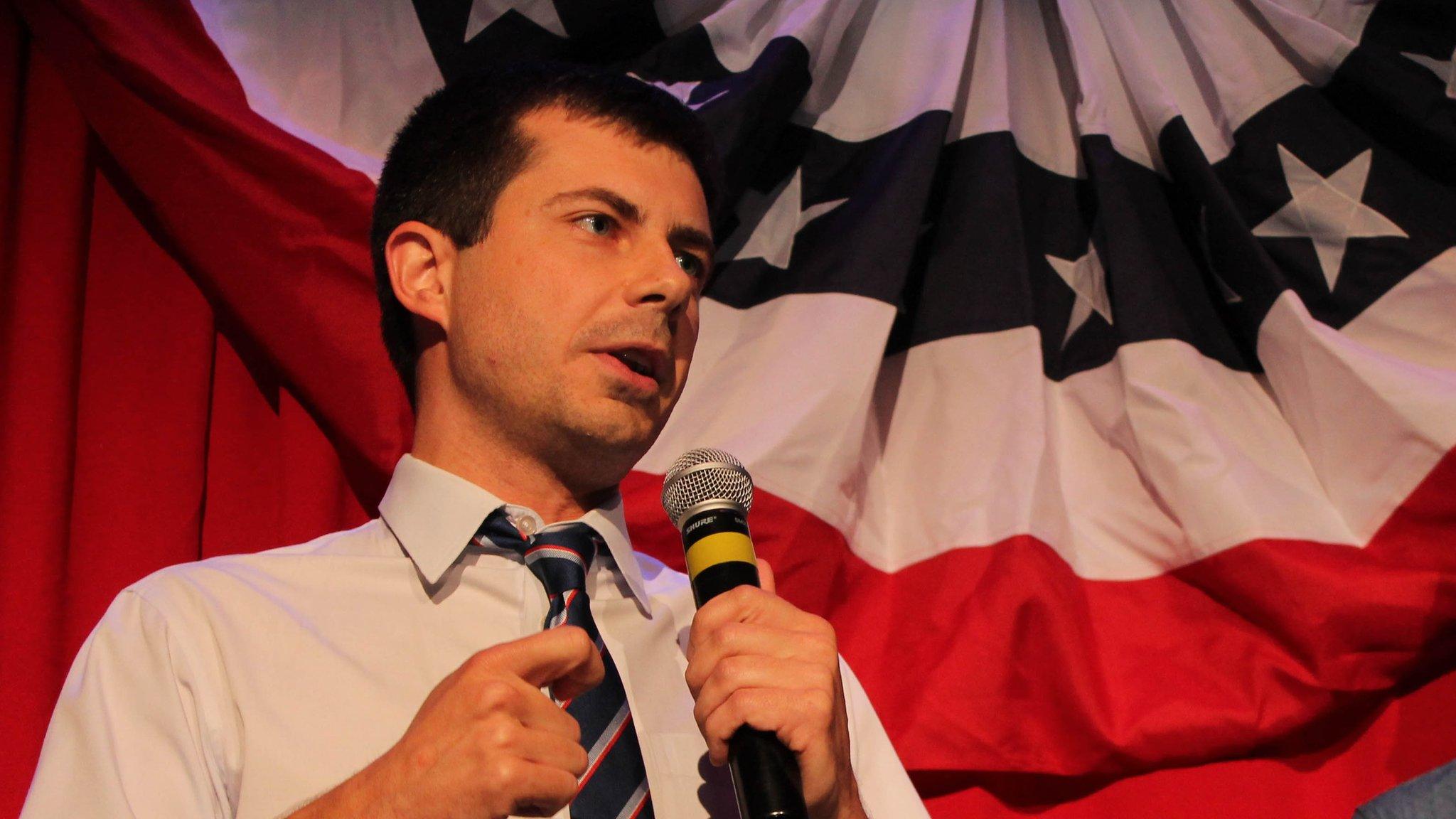
- Published1 April 2019
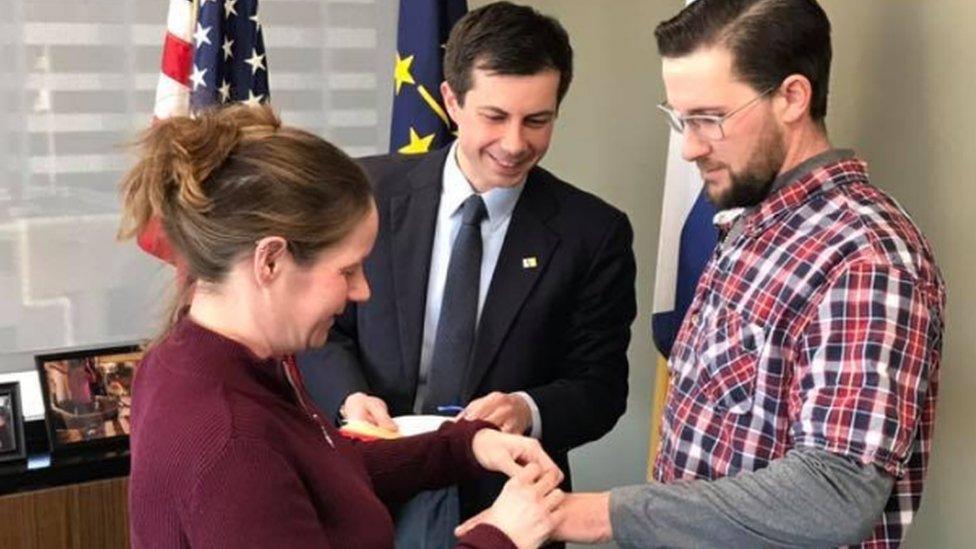
- Published3 April 2019
- Published26 March 2019
- Published5 March 2020

- Published12 March 2019
